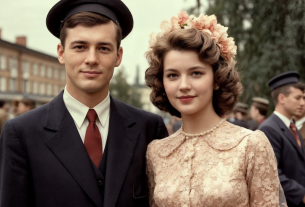Andrey sat across from Olga, tapping his fingers on the tabletop. His feigned nonchalance only emphasized the tension in the room. Behind him, leaning against the kitchen cabinet, stood Valentina Petrovna—his mother—with her usual expression of concerned benevolence on her face.
“So here’s the deal,” Andrey finally broke the silence, his voice sounding almost casual, as if discussing the purchase of a new kettle. “Either half the apartment or one and a half million in compensation. Your choice. Fair enough. We were married. Everything acquired during the marriage is joint property.”
A lump rose in Olga’s throat. Three years of marriage boiled down to a single phrase, delivered with the cold businesslike tone of a sales manager.
“That’s the apartment I bought before the wedding,” Olga said quietly. “The money was mine. An inheritance from my grandmother. Sale of the dacha. I signed the contract four days before…”
“But it was registered after,” he interrupted. “Which means — during the marriage.”
“Andryusha is right,” Valentina Petrovna joined in, placing a hand on her son’s shoulder. “Let’s settle this like reasonable people. Why drag this through courts and scandals? You’re a smart girl, Olenka.”
Olga looked at both of them: at her husband avoiding her gaze, at her mother-in-law with her fake concern in her eyes. The initial shock faded, replaced by cold fury. She slowly rose from the table and straightened her shoulders.
“All right,” her voice was calm, almost serene. “Then I’ll play too.” She paused, looking Andrey straight in the eyes. “But on my terms.”
In the ensuing silence, the dripping of water from a loosely closed tap was audible. Drip-drip-drip — as if marking the start of a new game, where not only the apartment but her dignity was at stake.
A year and a half ago
Olga often thought their meeting was like a scene from a romantic comedy. She, bent over her laptop in a coffee shop, working on a countryside house project, when he spilled coffee on her table. Andrey apologized with such charming clumsiness that it was impossible to be angry. Within half an hour, they were already debating modern architecture. Olga suddenly realized she hadn’t met a man in a long time who could talk so passionately and thoughtfully about art.
She was thirty-three, and she thought she knew what she wanted from life. Or at least she thought so. A successful career as an interior designer, her own portfolio of projects, independence. Andrey, an engineer with a philosophical mind, seemed like a breath of fresh air in her tightly scheduled life.
She diligently ignored the first warning signs. When he could talk for hours about his ideas but rarely implemented them. When he was late to meetings, explaining that “time is a construct.” When after three months of dating he proposed moving in together because he was “tired of paying for a rented apartment.”
They rented a small two-room flat near the city center. Olga continued working on projects, Andrey… Andrey talked a lot about the future. About how he would start his own business, how they would travel. His plans were grandiose and a bit vague, like a watercolor painting in the rain.
“We need a place of our own,” she said one evening, looking at another rent payment. “I’m tired of living out of suitcases.”
Andrey just shrugged: “Then let’s get married. It’ll be easier to get a mortgage.” It sounded less like a marriage proposal and more like solving a household issue.
But fate had other plans. The grandmother’s dacha that Olga had inherited a year ago unexpectedly attracted developers. The sale brought good money. Adding savings and bonuses from recent projects, she could afford a small but her own apartment.
Four days before the wedding, Olga signed the purchase agreement. Andrey was busy choosing a suit for the ceremony and seemed completely uninterested in the purchase process. “You’re the businesswoman here; you’ll figure it out,” he waved off when she tried to discuss the deal details.
She transferred the money to the seller from her personal account only after the registry office ceremony — the banks were closed for the weekend. The documents for the property registry were also submitted after the wedding — they didn’t have time before the ceremony.
Standing by the window of their new apartment, Olga looked out at the evening city and thought she finally had a real home. Andrey was scrolling through social media on the couch, not sharing her joy. Then she blamed it on wedding fatigue. Now, looking back, she understood — that was another warning she preferred not to hear.
Cracks
Spring sunshine flooded the kitchen, but the atmosphere in the apartment was colder than January frost. Olga mechanically stirred coffee on the stove, watching out of the corner of her eye as Andrey checked his phone for the third time that morning.
“Maybe you’ll tell me why you were fired?” she tried to speak calmly, though inside she was boiling.
“Like you don’t know,” he threw his phone on the table. “Boss is an idiot, didn’t appreciate my ideas. As always.”
“As always” had happened three times in two years. First a startup that failed. Then a conflict at the design bureau. Now this.
“Andrey, we need money. I can’t carry everything alone.”
“Oh yeah,” he theatrically threw up his hands. “The perfect woman speaks! You decide everything: where to live, how to live, how much to spend. Maybe I should ask permission before going to the bathroom?”
There was a knock at the door. Valentina Petrovna stood on the threshold with a bag of groceries and a worried look.
“I baked some pies…” she entered the kitchen, glancing at the tense faces. “Are you fighting again?”
“Mom, can you believe it, Her Majesty is upset that I’m temporarily unemployed.”
Valentina Petrovna shook her head and sat down at the table:
“Olenka, why are you like this with your husband? He’s a man; it’s hard enough for him.”
“Valentina Petrovna, I…”
“You know, son,” the mother-in-law seemed not to hear Olga, “you’re like a tenant to her. Here today, tomorrow kicked out — good riddance. I’ve seen too many smart ones. They use the man, then divorce — and a month later they bring home a new one.”
Olga suddenly stood up from the table:
“I’m going to work. I have a meeting with a client.”
“There!,” Valentina Petrovna threw up her hands. “Runs away again. Everything alone, everything by herself. And you, son, just sit here, wait for the lady to deign to return.”
In the evening, Olga found Andrey talking with his mother in the living room. When she appeared, they fell silent, but their looks told her they were talking about her.
“You’re not a man if your wife has everything and you have nothing,” came from behind the door. “She just used you. Too smart — watch out for those.”
A week later, Andrey filed for divorce. He brought the documents in the evening and silently put them on the table.
“I demand a division of property,” he said with a practiced tone. “The apartment was bought during the marriage, so I’m entitled to half.”
Olga looked at the man before her and didn’t recognize the one she had fallen in love with a year and a half ago. Before her stood a stranger with a familiar face, behind whom clearly loomed the shadow of Valentina Petrovna.
The Blow
Her phone vibrated insistently every ten minutes. Olga glanced at the screen: one number replaced another, all alike.
“Good afternoon, I am lawyer Petrov,”
“Legal consultation, we want to offer terms,”
“Let’s discuss an out-of-court settlement.”
She did not answer. She just sat in her office, staring at the monitor. The project hung halfway done — no strength or desire to finish. Thoughts tangled. How did this happen? After all, this was her apartment — money from grandmother’s dacha, her personal savings, her project bonuses. She remembered every penny, could confirm every payment.
A knock at the door made her flinch. A courier stood there with a folder of documents.
“Dear Olga Sergeevna, we hereby notify you…”
A lawsuit. Andrey demanded recognition of the apartment as jointly acquired property and half the value. One and a half million rubles — that was the cost of her naïveté.
The phone vibrated again. This time Andrey himself called.
“Did you get the documents?” his voice was unusually confident. “Let’s not complicate things. You registered the apartment after the wedding. Everything is joint property. The law is the law.”
“Andrey, you know it’s my money. Grandmother’s dacha…”
“I only know the documents were submitted after the marriage registration. Let the court decide the rest.”
Valentina Petrovna’s voice sounded in the receiver: “Tell her about precedents!”
Olga smiled bitterly. Of course, the mother-in-law was nearby. A couple of days later, she saw them near the legal consultation — Andrey and his mother walking and talking animatedly. Valentina Petrovna was holding a folder of documents.
The next day the mother-in-law called herself.
“Olenka, let’s talk,” her voice dripped with false concern. “Why all these courts? Give Andrey half and let’s part on good terms.”
“Valentina Petrovna, you know this is my apartment. You yourself said then I was smart to buy it myself…”
“You’re too smart,” the metal rang in her voice. “But you won’t outplay a woman who’s been through two divorces. Do you think I don’t know how these things are done?”
Olga was silent, listening to the short beeps on the line. Outside, darkness was falling, and her confused reflection appeared in the window glass. She needed to do something. But what?
She opened her laptop and typed in the search engine: “Family lawyer consultation.” It was time to start her own game. And play truly by her rules.
Her own game
The lawyer’s reception looked cold and strict — perfect for talks about other people’s divorces. Marina Viktorovna, a woman about fifty-five with an attentive gaze, methodically sorted through the documents Olga had brought.
“So, purchase agreement dated June 15… wedding June 19…” she made notes in her notebook. “And this is interesting. Very interesting.”
Olga leaned forward:
“What exactly?”
“Look,” the lawyer unfolded the documents towards her. “The contract was signed before the marriage. This is the key point. Even if the registration of ownership happened later, the determining factor is the date the contract was signed.”
For the first time in weeks, Olga felt a glimmer of hope.
“We need account statements,” Marina Viktorovna continued. “Proof the money was transferred from your personal account. And preferably — documents for the sale of the dacha.”
The next day Olga sat in the bank, waiting for the statements. Her phone vibrated — a message from the mother-in-law:
“Olenka, think it over. Why go through all this? You’re a smart girl. Give half — and live peacefully.”
She deleted the message without replying.
In the evening, sorting documents in the mezzanine, Olga found an old folder. The purchase agreement for grandmother’s dacha, bank statements, even draft calculations — everything was there. She always kept documents but never thought they’d be needed to defend herself from her own husband.
Olga smiled and opened her work email. A new project demanded attention, and the documents were already gathered. Now she only had to wait for the court and believe in justice. And in her own foresight.
Point of no return
The district court hearing room felt too cramped for the drama unfolding within its walls. Andrey sat opposite, confident and smug, his lawyer beside him with an impressive stack of papers.
“Your Honor,” Andrey’s representative proclaimed, “the apartment was registered with the property registry after the marriage. Therefore, it is jointly acquired property. My client demands compensation in the amount of one and a half million rubles — half the market value.”
First instance. Loss. Appeal.
“Don’t worry,” Marina Viktorovna reassured, flipping through documents. “We have ironclad evidence. Statements from your personal account, a receipt from the seller confirming payment — it’s all here.”
Second instance. Another loss. Cassation.
In the courthouse corridor, Valentina Petrovna smiled triumphantly:
“Well, smarty, did you overplay yourself? I told you — give it up nicely.”
After every session, Andrey sent messages:
“Maybe we can settle? One and a half million — and we split.”
“You’ll lose anyway, why drag it out?”
Supreme Court. The last instance. Olga sat clutching the folder of documents. Four months of courts, sleepless nights, nerves, and money — all for this moment.
The judge, a woman with a tired face, methodically studied the case materials:
“The court takes into account the following… According to Article 36 of the Family Code… The key point is the date of the purchase agreement…”
Olga felt her heart skip a beat.
“Registration of ownership with the property registry is a procedure of state registration, but not the moment ownership arises… The purchase agreement was signed before the marriage… Funds belonged to the plaintiff before the marriage…”
Silence hung in the room.
“The court rules: the claim is denied in full.”
Andrey jumped up:
“How come? But the registration…”
“Young man,” the judge looked over her glasses at him, “ownership arises at the moment the contract is signed. Registration is a formality. The apartment was acquired before the marriage, paid for with your wife’s personal funds. The decision is final and not subject to appeal.”
In the courthouse corridor, Valentina Petrovna was shouting something about injustice and bribed judges. Andrey stood leaning against the wall, confused and angry — a man facing reality for the first time, where not everything can be had just because you want it badly.
Olga left the courthouse. The April wind tossed her hair, the sun blinded her eyes. She took out her phone, found the realtor’s number:
“Good afternoon. Remember, we talked about selling the apartment? I’m ready to show it to potential buyers… Yes, tomorrow would be convenient…”
A clean slate
A month later she stood by the panoramic window of her new apartment. Bright, spacious, free from memories and strangers’ claims. Behind were the walls that echoed quarrels and grievances; ahead was a blank page, empty walls waiting for new paintings.
“You know,” her friend said while helping unpack boxes, “sometimes you just need to close the door and walk away. Even if you won.”
Olga nodded, arranging books on the shelves. She had won the battle for the old apartment, but the real victory was something else — the ability to start over without clinging to the past. A new home, a new chapter, a new life. And she would build this life herself, without looking back at others’ expectations and claims.



